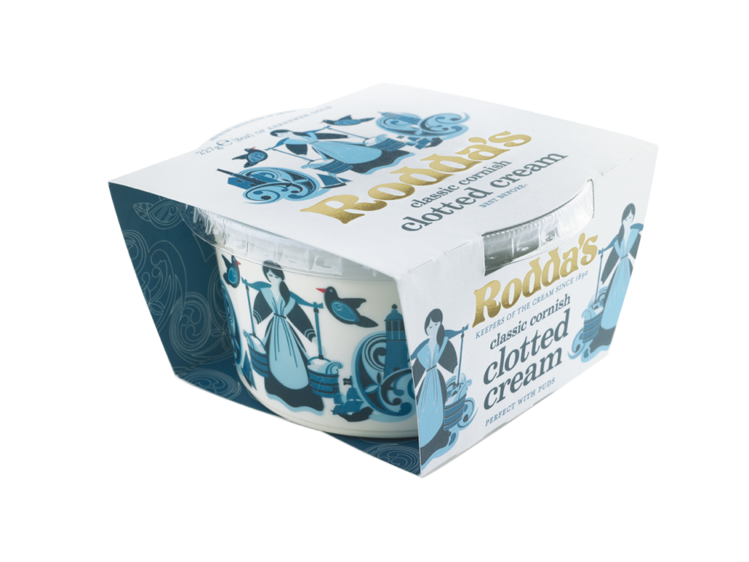Food firms back British GI labelling scheme

On 22 October, the Government laid out a statutory instrument in parliament - The Agricultural Products, Food and Drink (Amendment etc.) (EU Exit) Regulations 2020 to enact the change. The process enables a swift transition into law by circumventing the usual stages of parliamentary debate. The move follows a Government notice urging food firms to make all possible preparations for Brexit as soon as possible, precipitated by Prime Minister Boris Johnson's warning to brace for a potential no-deal scenario.
“The UK is celebrated for producing some of the very best food and drink in the world," said Nicholas Rodda, managing director, Rodda’s Creamery. "The new GI status will not only strengthen the authenticity of our Cornish clotted cream on a global stage, but also provide new opportunities for our business conversations internationally.
“We were delighted to be involved in the development of the GI logos, ensuring the prestigious nature of the PDO is represented within the new designs. The new GI status will ensure consumers can continue to enjoy Cornish clotted cream with knowledge that it has been made in Cornwall, with Cornish milk and crafted using traditional methods.”
Anglesey Sea Salt welcomed the continued protection of its Anglesey Sea Salt Halen Mon (PDO) name and special characteristics. A spokesperson for the business said:“In a world of cheap imitations and pressures on costs, it’s important for producers and consumers alike to be able to depend on a marque which is a guarantee of authenticity and quality.”
The proposed UK GI scheme designations
- Protected Designations of Origin (PDO), which requires all aspects of production, including sourcing materials, to take place within the defined geographical area;
- Protected Geographical Indications (PGI), which allows some elements of production and/or raw materials to take place outside the defined geographical area;
- Traditional Speciality Guaranteed (TSG), which denote products made to traditional recipes or methods, but not necessarily in a specific area.
At the end of the Brexit transition period, the new and independent schemes will grant a range of popular and traditional produce such as Scotch whisky and Welsh lamb special status.
Producers whose foods are granted GI status would benefit from intellectual property protection so others cannot imitate them, the Government stated.
Sales of British foods bearing GI logos represent about a quarter of UK food and drink exports by value, approaching £6bn in export value in 2019.
New GI logos
GIs are only awarded to highlight regional and traditional foods whose authenticity and origin can be guaranteed. The new logos can be displayed on all British produce granted GI status.
Environment secretary George Eustice said on 22 October: “The new UK protected food name scheme will replace the old EU one and will ensure that we continue to recognise and celebrate protected food names and local recipes across our country."
“The new logos launched today will become a staple on supermarket aisles in the UK and mean shoppers will be able to pick the best of British, from Scotch whisky and Welsh lamb to Cornish clotted cream.”
GI legislation
The UK GI schemes will replace the EU’s schemes on 1 January 2021 as the transition period ends. The legislation laid in parliament is designed to:
- provide the legal framework in England, Scotland and Wales to administer and enforce the GI schemes;
- ensure continued protection of existing UK-origin GIs and non-UK GIs agreed through trade agreements;
- Establish the new UK logo in law and ensure EU GI logos are no longer required on GB products;
- Simplify the application process
Registered producers of British food, drink and agricultural GI products that are required to use the logos will have until 1 January 2024 to change packaging to display the new UK GI logos. The timeframe would enable producers, who have been consulted extensively on the scheme, to introduce the logos to their products in good time, the Government said.
Guidance is available on GOV.UK including for the simplified process on new UK GI application.
Northern Ireland and Ireland
All UK products currently protected under the EU’s GI schemes, including those from Northern Ireland, will continue to be protected in the UK and the EU after the end of the transition period.
The Government has also confirmed that registered GIs that can be produced anywhere on the island of Ireland, will continue to be fully protected in the UK and the EU. These include Irish Whiskey; Irish Cream and Irish Poteen.
From 1 January 2021, producers will need to apply to the relevant:
- UK scheme to protect a new product name in Great Britain (GB)
- EU scheme to protect a new product name in Northern Ireland (NI) and the EU
The Government said it was also working to expand and increase the number of GI protections through Free Trade Agreements. The recently announced UK-Japan Comprehensive Economic Partnership Agreement would increase GIs from just seven under the terms of the EU-Japan deal to potentially more than 70, boosting recognition of UK brands in the Japanese market. the Government claimed.
















